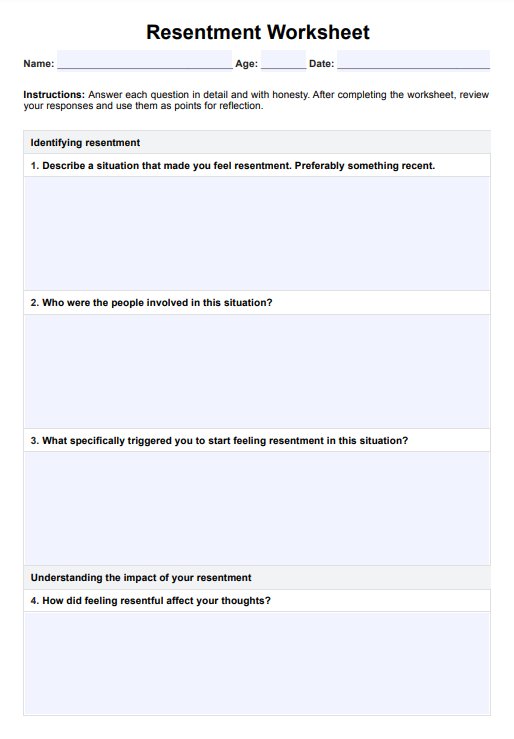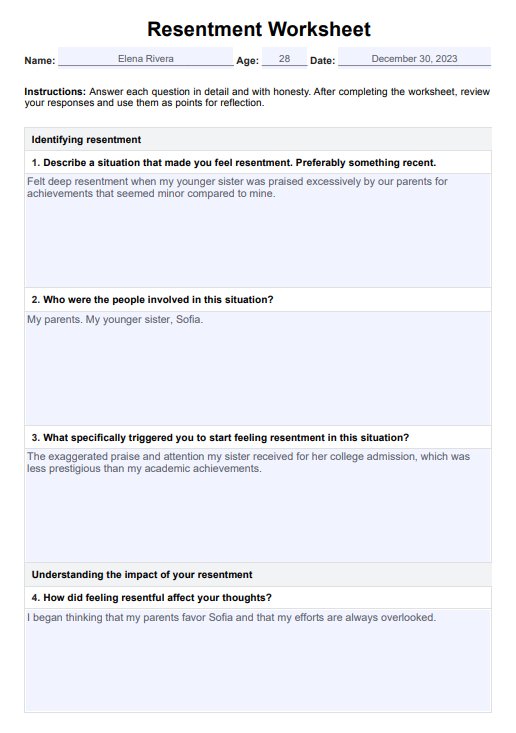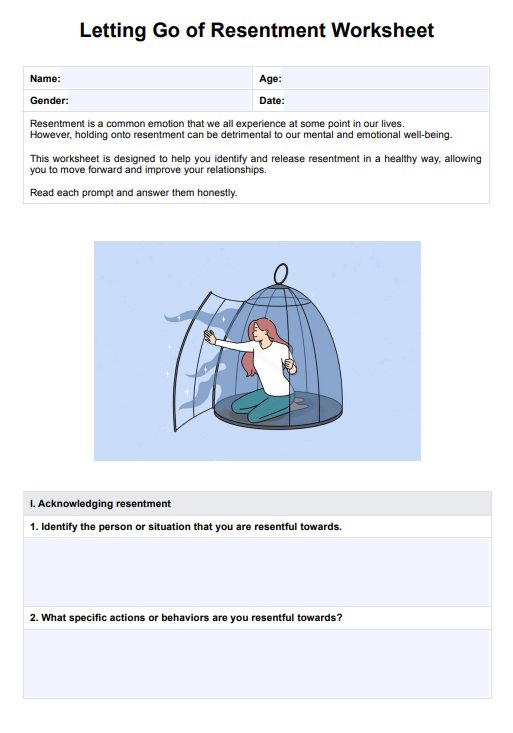Resentment Worksheet
Use this Resentment Worksheet to help clients become more cognizant of their resentment and help them work through and let go of it.


Undertanding resentment
Resentment is a deep-seated and often persistent bitterness or anger that stems from a sense of injustice or mistreatment. This emotion can arise in various contexts, from personal relationships and workplace dynamics to societal injustices. Resentment is more than mere annoyance; it's a lingering emotional state that can significantly impact an individual's mental and emotional well-being, often arising from any extreme example of perceived injustice or mistreatment.
The root causes of resentment are multifaceted. They can include experiences such as betrayal by a trusted individual, feeling overlooked or undervalued, inequitable treatment, or enduring unfairness over time. These experiences lead to a sense of grievance, where the individual feels they have been wronged in some way.
Resentment can also stem from unmet expectations, both from others and self-imposed. When people or situations fail to meet these expectations, it can lead to feelings of disappointment that evolve into resentment. Additionally, past traumas and unresolved conflicts are fertile ground for resentment to grow and fester.
Resentment Worksheet Template
Resentment Worksheet Example
How to use this Resentment Worksheet
This editable Resentment Worksheet is valuable for mental health professionals and their clients. It provides a structured approach to identifying, understanding, and addressing feelings of resentment. Here's how to use it effectively:
Step 1: Access our template
Download the template using the link in this guide. Healthcare professionals can also access the Resentment Worksheet via the Carepatron platform, where you can open, edit, and share it. The template is designed to be straightforward, making it easy for therapists and clients to use.
Step 2: Explain the template to the client
Therapists should clearly explain the purpose of each section of the worksheet to their clients and discuss how it can help them identify and process their feelings of resentment. You can give it to clients to complete independently, or you can work on it together during their sessions for deeper discussion and insight.
Step 3: Encourage honest reflection
Urge clients to be honest and detailed when describing situations where they feel resentment. This honest reflection is crucial for a deep understanding of their emotions.
Step 4: Analyze underlying emotions
The fourth step is guiding clients to explore and acknowledge the underlying emotions of resentment. Understanding these emotions is critical to addressing the root causes of resentment.
Step 5: Identify patterns and triggers
Help clients recognize any patterns or common triggers in their experiences of resentment. This insight can be instrumental in developing coping strategies.
Step 6: Discuss coping strategies
Discuss past coping strategies with clients and their effectiveness. Then, collaboratively explore and suggest new strategies that might be more effective.
Step 7: Plan to help them let go of their resentment
Encourage clients to identify steps they can take to let go of resentment. Setting a clear plan and a date to review progress can be incredibly empowering.
Step 8: Regular review and adaptation
Revisit the worksheet regularly with your clients or clients to review progress, make adjustments, and reinforce new coping strategies.
We also have a similar worksheet called the Resentment Inventory, which only focuses on what made a person resentful, how their resentment affects them, and what they did due to their resentment. This Resentment Inventory Worksheet is best suited for those without the proper emotional distance and skills to examine their resentment properly. On the other hand, this Resentment Worksheet asks people to examine their patterns of resentment, develop coping strategies, and have them identify what it would take to let go.
The benefits of using this worksheet
The Resentment Worksheet is a practical tool designed to assist individuals in understanding and managing their feelings of resentment. Here are some of the key benefits of using this worksheet:
Facilitates self-reflection
The worksheet encourages users to explore their resentment introspectively, helping them understand the root causes and triggers. This self-reflection, requiring individuals to spend time introspectively, is a crucial step in emotional healing.
Enhances emotional awareness
The worksheet helps develop greater emotional awareness by identifying the underlying emotions associated with resentment, such as anger or hurt. Emotional awareness is key to emotional intelligence and healthy relationships.
Promotes healthy coping mechanisms
Through the worksheet, individuals can explore and document effective coping strategies for managing resentment. This process encourages the adoption of healthier ways to deal with negative emotions.
Encourages forgiveness and letting go
The worksheet guides users in identifying steps towards forgiveness and letting go of grudges, which is essential for emotional freedom and well-being. You can even use other resentment worksheets like the Letting Go of Resentment Worksheet to help with this.
How resentment impacts mental health
Resentment can have profound and varied effects on an individual's mental health. Understanding these impacts is crucial for both healthcare professionals and clients. Here are some key effects:
- Negatively impacts emotional well-being: Resentment can lead to prolonged negative emotions, such as anger, sadness, or frustration, significantly impacting emotional balance and overall well-being.
- Increases stress levels: Holding onto resentment often results in elevated stress levels. This ongoing stress can have various physical and psychological effects, including anxiety, depression, and difficulty in managing emotions.
- May impact relationships: Resentment can strain personal and professional relationships. It creates barriers to communication, diminishes trust, and can lead to a cycle of negativity and conflict, including the loss of hope that things can improve.
- Hinders personal growth: Harboring resentment can prevent individuals from moving forward in life. It often leads to a fixation on the past and hampers personal development and the ability to overcome challenges.
- May affect physical health: The stress associated with resentment can also manifest physically, leading to headaches, sleep disturbances, or even chronic health issues like hypertension, and can severely affect an individual's self-esteem.
- May lead to cognitive impairments: Resentment can cloud judgment and affect decision-making. It often leads to a biased perception of situations, impacting one's ability to think clearly and rationally.
Tips to give clients to help them shed resentment
Reducing resentment is a proactive process that involves both reflection and action. Here are some practical tips mental health professionals can suggest to their clients to help manage and alleviate feelings of resentment:
Help them acknowledge and express their feelings
Encourage clients to recognize and express their feelings related to resentment. For instance, if a client feels resentful toward a colleague for receiving the recognition they deserve, they could write about these feelings in a journal or discuss them in a therapy session. Expressing these emotions can help them process and understand them better.
Teach them how to practice empathy
Suggest that clients try to understand the situation from the other person's viewpoint. For example, if they frequently resent a friend for canceling plans, they could consider possible reasons behind their friend's actions, like family obligations or work stress. This perspective might help in reducing negative feelings.
Help them focus on personal growth
Encouraging clients to focus on their personal development can be a constructive way to redirect energy from harboring resentment. For example, a client who resents an old friend for a past misunderstanding could channel their energy into a new hobby or skill they've always wanted to learn.
Help them learn how to let go of expectations
Help clients understand the importance of releasing unrealistic expectations. For example, if a client expects their sibling to always agree with them, this expectation might lead to resentment when disagreements occur. Encouraging them to accept and respect differences can mitigate feelings of resentment.
Commonly asked questions
Resenting someone often feels like harboring a deep-seated anger or bitterness towards them. It can be emotionally draining and manifest as persistent negative thoughts about the person or situation.
Being the recipient of resentment can feel isolating and hurtful. It often leads to strained relationships and misunderstandings; one might feel unfairly judged or misunderstood.
The purpose of resentment, while not beneficial, is often a psychological response to perceived unfairness or injustice. It is an emotional indicator that something in our relationships or interactions needs attention or resolution.


























-template.jpg)

















































































